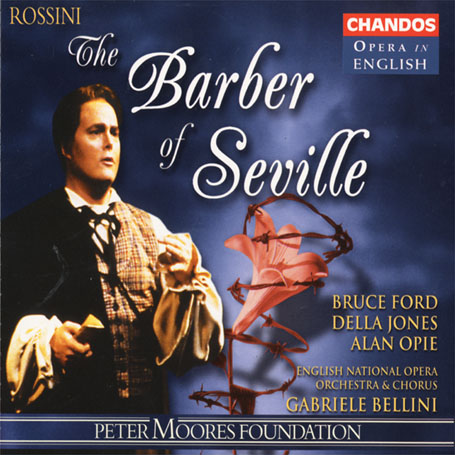Rossini Barber of Seville (English)
Thoroughly musical, moderately amusing, the accomplished English Barber is reissued in improved format
View record and artist detailsRecord and Artist Details
Composer or Director: Gioachino Rossini
Genre:
Opera
Label: Opera in English Series
Magazine Review Date: 9/2000
Media Format: CD or Download
Media Runtime: 149
Mastering:
DDD
Catalogue Number: CHAN3025

Tracks:
| Composition | Artist Credit |
|---|---|
| (Il) Barbiere di Siviglia, '(The) Barber of Seville' |
Gioachino Rossini, Composer
Alan Opie, Figaro, Baritone Andrew Shore, Doctor Bartolo, Baritone Bruce Ford, Almaviva, Tenor Christopher Ross, Officer, Baritone Della Jones, Rosina, Mezzo soprano English National Opera Chorus English National Opera Orchestra Gabriele Bellini, Conductor Gioachino Rossini, Composer Jennifer Rhys-Davies, Berta, Mezzo soprano Peter Rose, Don Basilio, Bass Peter Snipp, Fiorello, Bass |
Author: John Steane
This well-received recording is now issued in a format compatible with more recent additions to the Chandos Opera in English series. The repackaged set accommodates a larger-size booklet with the libretto in bigger print, the biographical notes expanded and updated. John Rosselli’s excellent introductory essay remains.
Hearing it again has been a pleasure, just slightly mixed with the sense (expressed in Quarterly Retrospect, 4/96, at the time of the first issue) that the clear enunciation of a lively translation has its downside – one becomes more uncomfortably aware of laughs expected but unforthcoming. The case for comic opera in translation seems on the face of it to be stronger than that for tragedy, but it has to be put to the test, and the test is whether it makes you laugh or at least smile internally, more often. I find one is conscious that the rhyme, or the singer’s expression, is soliciting laughter which simply refuses to rise. It is really much better when the spirit of comedy arrives unannounced in the course of a relatively unintelligible ensemble and is suddenly discovered there, in the midst and in charge.
Perhaps it is so as to allow the words maximum clarity that the conductor, Gabriele Bellini, sets speeds that are more answerable to common sense than inspired nonsense. Certainly he is good at building the great Act 1 Finale and other concerted numbers stage by stage, and the precision of the ensemble work is totally admirable. But somewhere in the mix a little devil of mirth and sport is missing. Alan Opie’s Figaro is touched by it, but Peter Rose’s Basilio seems impervious, and the highly professional Bartolo of Andrew Shore becomes too much of a conscientious comic-turn. On stage everything might come naturally right in a way that’s difficult to achieve in a studio recording. What gives unalloyed pleasure – in addition to the ensemble work of the whole company, singers and orchestra – is the scrupulous, easy-sounding virtuosity of the principals, Della Jones and Bruce Ford especially, as they deal with scales, gruppetti, high notes and so forth. In such graceful accomplishments this recording can compete with any.'
Hearing it again has been a pleasure, just slightly mixed with the sense (expressed in Quarterly Retrospect, 4/96, at the time of the first issue) that the clear enunciation of a lively translation has its downside – one becomes more uncomfortably aware of laughs expected but unforthcoming. The case for comic opera in translation seems on the face of it to be stronger than that for tragedy, but it has to be put to the test, and the test is whether it makes you laugh or at least smile internally, more often. I find one is conscious that the rhyme, or the singer’s expression, is soliciting laughter which simply refuses to rise. It is really much better when the spirit of comedy arrives unannounced in the course of a relatively unintelligible ensemble and is suddenly discovered there, in the midst and in charge.
Perhaps it is so as to allow the words maximum clarity that the conductor, Gabriele Bellini, sets speeds that are more answerable to common sense than inspired nonsense. Certainly he is good at building the great Act 1 Finale and other concerted numbers stage by stage, and the precision of the ensemble work is totally admirable. But somewhere in the mix a little devil of mirth and sport is missing. Alan Opie’s Figaro is touched by it, but Peter Rose’s Basilio seems impervious, and the highly professional Bartolo of Andrew Shore becomes too much of a conscientious comic-turn. On stage everything might come naturally right in a way that’s difficult to achieve in a studio recording. What gives unalloyed pleasure – in addition to the ensemble work of the whole company, singers and orchestra – is the scrupulous, easy-sounding virtuosity of the principals, Della Jones and Bruce Ford especially, as they deal with scales, gruppetti, high notes and so forth. In such graceful accomplishments this recording can compete with any.'
Discover the world's largest classical music catalogue with Presto Music.

Gramophone Digital Club
- Digital Edition
- Digital Archive
- Reviews Database
- Full website access
From £8.75 / month
Subscribe
Gramophone Full Club
- Print Edition
- Digital Edition
- Digital Archive
- Reviews Database
- Full website access
From £11.00 / month
Subscribe
If you are a library, university or other organisation that would be interested in an institutional subscription to Gramophone please click here for further information.




